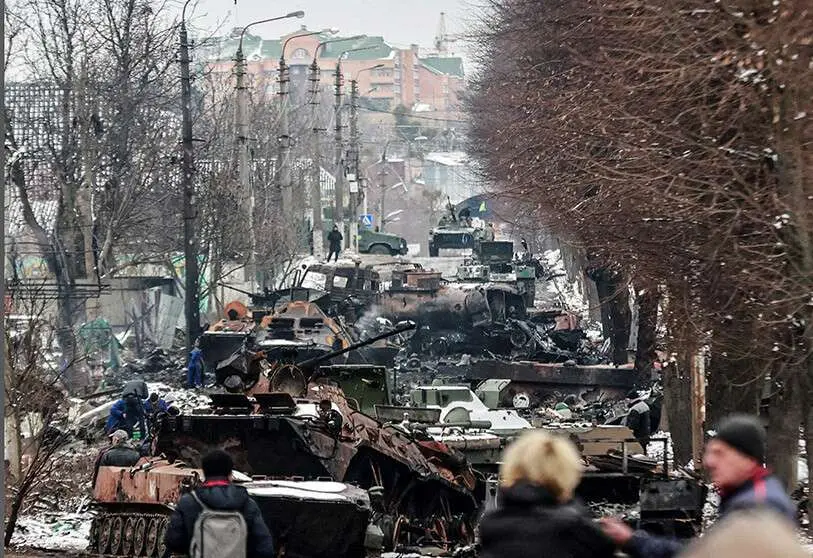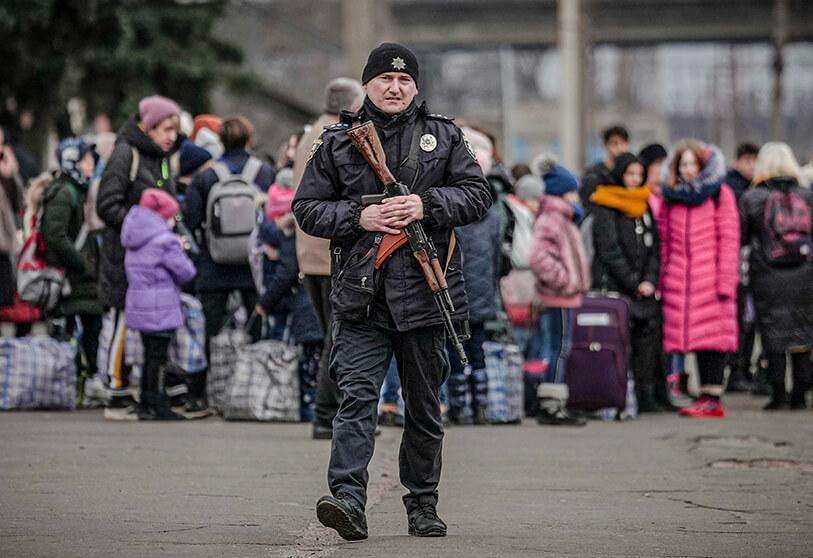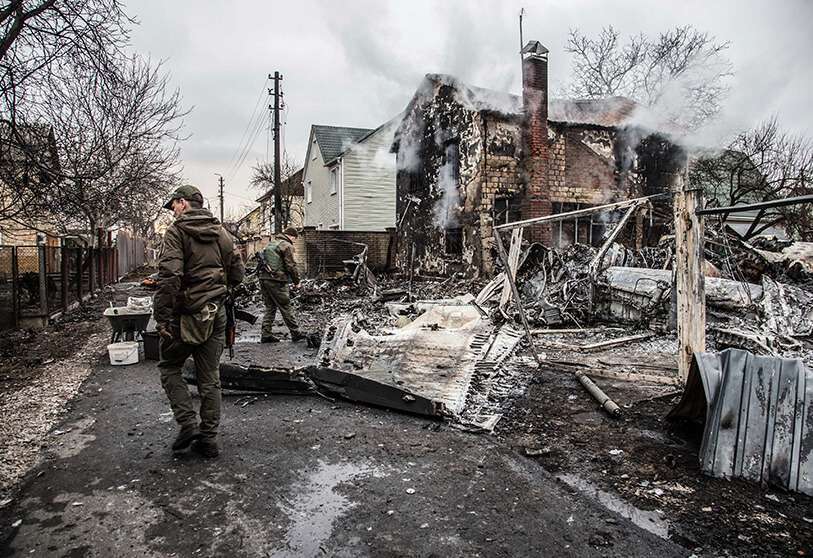Consequences of the invasion of Ukraine and the role of the EU in the world order

The price rises in the EU and the Eurozone in 2021 and early 2022 required rethinking and substantially altering the unilateral green transition policy which, while it has cut gas emissions in the EU, has pushed up energy prices and will continue to encourage the relocation of production and emissions to countries with laxer environmental legislation, whose products we EU citizens then happily import and consume without asking ourselves how much gas emissions were generated in producing them.
The rise in the price of gas emission allowances in the EU since 2018, coupled with production disruptions and bottlenecks caused by the pandemic in 2020-2021, and geopolitical tensions between Russia and Ukraine and Algeria and Morocco, led to sharp increases in the price of natural gas in the second half of 2021 that eventually pushed up producer prices in industrial sectors as demand recovered, and accelerated the growth of prices of consumer goods and services, especially food, energy and transport, to rates not seen in several decades. Rising consumer prices are, in turn, putting upward pressure on money wages, threatening the competitiveness of European businesses, especially the most energy-intensive ones, and leaving the ECB with a choice between tackling inflation or underpinning economic recovery.
The barbaric military invasion of Ukraine ordered by President Putin - unjustifiable even if one concedes the existence of democratic deficiencies and territorial tensions in Ukraine and the Kremlin's logical concern at the prospect of NATO membership - with the undisguised pretence of altering borders by force of arms and installing a puppet government, and the subsequent political and economic-financial sanctions adopted by the United States, the EU and other Western countries, with the intention of causing financial asphyxiation of the Russian economy and freezing the assets of those mainly responsible for the invasion, have added fuel to the inflationary pyre, and threaten to plunge us into a scenario of stagnation and inflation in the EU reminiscent of the situation experienced in the last century following the price rises of oil and other raw materials in the 1970s.

There is no doubt that the citizens most affected by the invasion and the sanctions that broaden and deepen those already imposed by the EU after the invasion and annexation of Crimea in 2014 will be, in this order, Ukrainians, Russians and EU citizens. In the case of the Ukrainians, in addition to the irreparable loss of life and the pain and hardship caused by the departure of hundreds of thousands of Ukrainians seeking to leave the war behind, there is the destruction of infrastructure and equipment, production facilities and residential housing. The cost is already very high and it is a truism to add that the longer the fighting continues, the greater the devastation and the greater the resources and time needed to heal the deep wounds that have opened up across the country.
In contrast to the Ukrainians, the invasion will not be as deadly or destructive for Russian citizens, nor will it dramatically alter their daily lives in the short term, although it has generated some social protest against the war despite the severe repressive measures adopted by the Kremlin. In addition to the superiority of the Russian army in terms of numbers and equipment, the war is being played out on the other side of the conflict, and life in Russia is going on smoothly, with only the logical concern of citizens to save their savings and survive the price rises. These difficulties could intensify in the future if the sanctions imposed by the US, the EU and other Western countries after the outbreak of hostilities are maintained for a prolonged period of time.
For the time being, the sanctions have caused the rouble and the MOEX stock index to plummet, forcing the government to close the market on 25 February. The rouble has lost 32.3 % of its value between 16 February and 5 March, but the effects of the rouble's depreciation and the stock market closure do not affect the majority of the population who use only roubles and do not invest in the stock market. More worrying are the effects that sanctions may have on producer and consumer prices in the medium term. In January 2022, the increases in producer and consumer prices over the last twelve months amounted to 23.1% and 8.73%, respectively, which are somewhat higher, but not too far away, from those recorded in EU countries. These price rises, which pre-date the start of the invasion, could increase considerably if the financial sanctions adopted and the depreciation of the rouble lead to shortages and soar prices for imported goods.
It is worth bearing in mind that the financial sanctions adopted by the EU do not prohibit trade with Russian companies, but merely make it more difficult to settle trade transactions by excluding some Russian banks from the SWIFT system, and 'impose restrictive measures to prevent the Central Bank of Russia (CBR) from deploying its international reserves in a way that undermines the effectiveness of the sanctions'. But without the freezing of BCR assets deposited in the EU, the commitment to 'impose restrictive measures' is not very credible. Paradoxically, while the EU is sending offensive weapons to Ukraine to combat the Russian invasion, Russian gas continues to flow to EU countries, and gas-receiving countries will continue to foot the bill for the invading government in one way or another.

As we said at the beginning of the article, the rise in the prices of natural gas, oil, cereals and some metals will drive the increases in producer prices recorded in developed economies in 2021, and will slow down the global economic recovery in 2022 and 2023, placing the governing bodies of the main central banks of the advanced economies in a very delicate situation: how to curb runaway inflation without plunging their economies into a new recession. The EU and Eurozone countries, due to their proximity to and dependence on certain imports from Russia and Ukraine, will undoubtedly be the economies that suffer the most.
Gas and oil prices have risen sharply since the beginning of the conflict. The price of natural gas rose by 20.8 % and the price of Brent crude by 21.4 % between 23 February and 5 March; high as they are, these increases are dwarfed by the 132.2 % rise in the price of natural gas on the Dutch market over the same period. There is no doubt that the effects of higher energy prices in the EU and the Eurozone will be much stronger than in other advanced economies, such as the United States, even if Russia decides not to respond to EU sanctions by cutting off natural gas supplies through pipelines running through Ukraine and Belarus. Similarly, wheat prices rose 59.0%, corn 18.1% in the last week, and aluminium and palladium 15.7% and 21.7%, respectively. The only relief for European companies comes from the fall in the price of emission allowances, 23.1% in the last week, although their price is still 73.6% higher than a year ago.
President Sánchez warned in his institutional appearance on 24 February that "this conflict and the sanctions arising from it will undoubtedly have an economic impact on our country and the European Union, especially on the energy markets... and we will take whatever measures are necessary to mitigate the economic impact, including the energy impact, of this crisis on Spanish society, on its companies, on households, on industry, and undoubtedly also on the economic recovery that we are beginning on the verge of overcoming the pandemic". As was the case when COVID-19 broke out at the beginning of 2020, the Spanish president and the EU as a whole are arriving at the meeting with this new crisis too late, without having done their homework.

Both the pandemic crisis and the invasion of Ukraine have exposed weaknesses in an EU that lacks medium-term strategies and effective short-term policies to defend its values, its way of life and the welfare of its citizens, beyond its unilateral commitment to ecological transition. It is time to recognise that China's progressive transformation into the world's factory has placed EU economies in a situation of dangerous vulnerability, aggravated by their energy dependence on Russia. The invasion of Ukraine has also revealed the ineffectiveness of the diplomatic initiatives that both Germany and France, individually, and the European institutions, collectively, have deployed to find a negotiated solution to a conflict that has been dragging on since the invasion of Crimea in 2014.
We are faced with chronic weaknesses of a strategic nature, nurtured with great unconsciousness by the defenders of the benefits of the new international distribution of labour and the benefits of international trade, who, let us be clear, prioritise the interests of multinational companies that only seem to be concerned with producing where they can obtain the greatest short-term profit, without paying much attention to the political circumstances in the countries where they are located and to the environmental consequences of their activities. And also, of course, because of a certain complacency on the part of the EU institutions themselves, which have been content to play a secondary role on the chessboard of bloc politics, rather than resolutely defending their geopolitical interests, economic interests and environmental concerns.
There are three interrelated questions that Europe's leaders should be asking themselves at this critical juncture. First, what can EU institutions do to meet the energy needs of their citizens without jeopardising price stability? Second, is it desirable to invest in countries with lax environmental and labour regulations and import the goods produced there at high environmental costs? And third, what are the most effective diplomatic and defence strategies to resolve the conflicts that will inevitably arise with autocratic or dictatorial governments with vast territories and resources, armies equipped with intercontinental missiles, and little willingness to accept the rules of the game (rules of international law, compliance with trade agreements, respect for intellectual property, etc.), and to forgo the use of brute force to gain territorial or economic advantage?
Western countries' dependence on Chinese industry and Russian energy, Beijing's collusion with North Korea and its undisguised claims over Taiwan, the invasion of Ukraine, and the strengthening of the Moscow-Beijing axis should make European institutions reflect on the fragility and limitations of the idyllic and self-congratulatory scenario in which they were installed. The EU is an economic giant with serious governance deficiencies. There is an urgent need to boost industrial production in general, not just semiconductor production, and to reduce energy dependence to ensure self-sufficiency in crisis situations, and an adequate deterrent force to deal with future aggression is indispensable. I am not convinced that Spain's budget for fighting poverty and gender-based violence is insufficient, but I am convinced that the Ministry of Defence is understaffed and underfunded.

